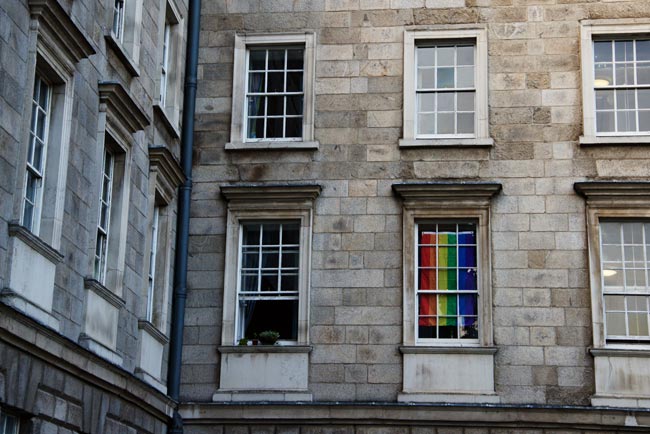While Ireland has made LGBT history by being the first country in the world to introduce equal marriage by popular vote, information on Ireland’s queer past is often difficult to come across. Whether intentionally buried by past generations or simply overlooked by historians, the lack of a sense of LGBT history can feel isolating for a queer person, and overall makes Irish culture seem a lot more homogenous than is actually the case. On a rainy afternoon, marking one of the final events of Rainbow Week, an LGBT History Walking Tour organised by ArcSoc helped to uncover a long and colourful history of LGBT characters that called this city home.
Jennifer O’Shea and Patricia Gendre of Gays About Town took us on a stroll of the south city centre amidst the hazy spring showers. Between them the tour guides had a well of knowledge about Irish LGBT heroes and villains, and threw in plenty of interesting Dublin trivia for good measure. O’Shea, a final year student of Ancient & Medieval History and Culture in Trinity, showed a passion for Irish LGBT history and provided plenty of laughs along the way. Gendre, a tour guide hailing from France, coupled a friendly manner with an encyclopedic knowledge of Dublin. As we walked and talked on the way to our next stop, she pointed out the detailing on a pillar of the National Library building on Kildare Street which depicts monkeys playing pool. The place used to be a gambling house in the 18th century.
Gays About Town is a joint initiative between O’Shea and Gendre. While in its early stages – O’Shea tells me they started doing tours in November last year – it’s clear that the tour has something unique to offer in a city with so much queer history that is often sadly left out of the limelight. O’Shea recounts to us around the different stops tales of homosexuality that pre-date the Christian era all the way up to modern times, including a look at the lesbian and gay figures that played important roles in the 1916 Rising which may be of particular interest coming up to the Easter commemorations.
Often accounts of non-heterosexual relationships are written out of the history books, meaning that even historical figures that are household names may not be known to us as the LGB heroes they were. While O’Shea mentions the case of Roger Casement’s diaries that have received increasing attention in recent years, she also mentions evidence and rumours about a number of other prominent Irish figures, and like any good history student also provides an evaluation of how true the claims may be. How did Gays About Town find out so much information on Ireland’s gay history? “Jennifer did a lot of reading”, Gendre tells me. With so much digging and reading into subtext of whitewashed accounts to be done, Gays About Town provide a useful and entertaining service. They’ve done the hard work so you don’t have to, and present their findings in an interesting way, allowing the figures of Dublin’s queer past to come alive in the very settings they called home.
O’Shea masterfully mixes a witty delivery of the more light-hearted stories with a serious look at the grave struggles some have suffered at the hands of an often repressive society. While celebrating the recent monumental marriage equality, O’Shea recounts to us the murders of Declan Flynn and Charles Self in the early 1980s which spurred on the Irish gay rights movement and resulted in the annual Pride celebration that we know and love today.
While the turnout for the tour was small, a factor which could be down to the poor weather and an issue with the time listed for the event in the Rainbow Week email, Gays About Town will be scheduling tours during Dublin’s Pride festival in June and are also available for booking through their Facebook page. The tour is a delightful way to spend a couple of hours and is a must for anyone looking for more information about Dublin’s overlooked LGBT history.







